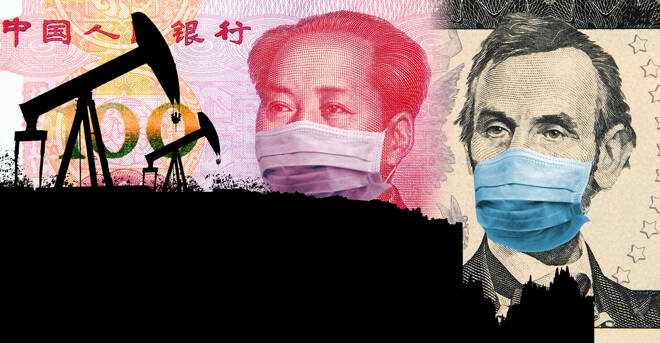Advertisement
Advertisement
New COVID Lockdowns Bring Into Question China’s Backstop Bid For Oil
By:
China’s decision yesterday to lockdown Shenyang as part of its core ‘zero-COVID’ strategy again brings into question its ability to continue to act as the world’s backstop bid for crude oil
Key Highlights
- China’s latest COVID lockdown raises more questions over its GDP trajectory
- This, in turn, threatens its ability to act as the global backstop bid for oil
- Lower growth will also add pressure to its huge debt burden
China’s decision yesterday to lockdown Shenyang, an industrial city of 9 million people, as part of its core ‘zero-COVID’ strategy, again brings into question the country’s ability to continue to act as the world’s backstop bid for crude oil, over and above the short-term supply disruptions resulting from Russia’s invasion of Ukraine.
Given the extreme disconnect between, on the one hand, China’s huge economy-driven oil needs and, on the other hand, its minimal level of domestic oil reserves, the country’s net-bullish influence over oil prices has long been profound. This oil consumption boom from China was a product largely of the 8+ percent average annual GDP growth recorded by the country over that period, with many spikes well above 10 percent.
As a result of this imbalance, China almost alone created the 2000-2014 commodities ‘supercycle’, characterised by consistently rising price trends for all commodities that are used in a booming manufacturing and infrastructure environment.
Although China has slightly moderated this ‘zero-COVID’ strategy – to allow for daily increases in symptomatic cases to be capped at around 200 on a national basis – this adjustment is of little practical use, given that it is currently seeing the largest wave of COVID infections since the Wuhan outbreaks in early 2020.
“The jump in asymptomatic cases to more than 7,200 since March has highlighted the challenges in China’s strategy,” Eugenia Fabon Victorino, head of Asia Strategy for SEB, in Singapore, told FX Empire. “Although containment measures have become more targeted this year, China’s approach to aggressively trace possible exposures to the virus has now put more than 184,000 individuals under medical observation in isolation…and official rhetoric has not signalled any softening in this containment strategy in the near term,” she added.
“The COVID situation makes it even more challenging for the government to reach its ambitious growth target of about 5.5 percent,” she underlined.
Lower Growth Adds To Debt Burden
Added macroeconomic uncertainty will add to corollary longstanding concerns about enormous debt that China has accrued by dint of a multitude of difficult-to-examine state-run schemes, most notably up until relatively recently ‘wealth management products’ (WMPs). These mirror the range of off-balance sheet products – particularly the collateralised debt obligations and later credit default swaps – that the Western banks had in 2007/08, which ultimately snowballed into the Great Financial Crisis, as analysed in depth in my new book on the global oil markets.
These concerns over China’s mountainous debt position increased recently with recent news of debt-related troubles at Evergrande. Originally a real estate developer – therefore, at the centre of the Chinese government’s previous initiatives to fuel economic growth by huge infrastructure building projects, including new towns and cities – Evergrande took on even more debt (including through extensive bond issues) expanding its business portfolio.
Unsurprisingly, it is struggling to pay this debt and to service its bond payments, just like those who have known about China’s hidden debt pile for years were warning.
About the Author
Simon Watkinsauthor
Simon Watkins is a former senior FX trader and salesman, financial journalist, and best-selling author. He was Head of Forex Institutional Sales and Trading for Credit Lyonnais, and later Director of Forex at Bank of Montreal. He was then Head of Weekly Publications and Chief Writer for Business Monitor International, Head of Fuel Oil Products for Platts, and Global Managing Editor of Research for Renaissance Capital in Moscow.
Advertisement
